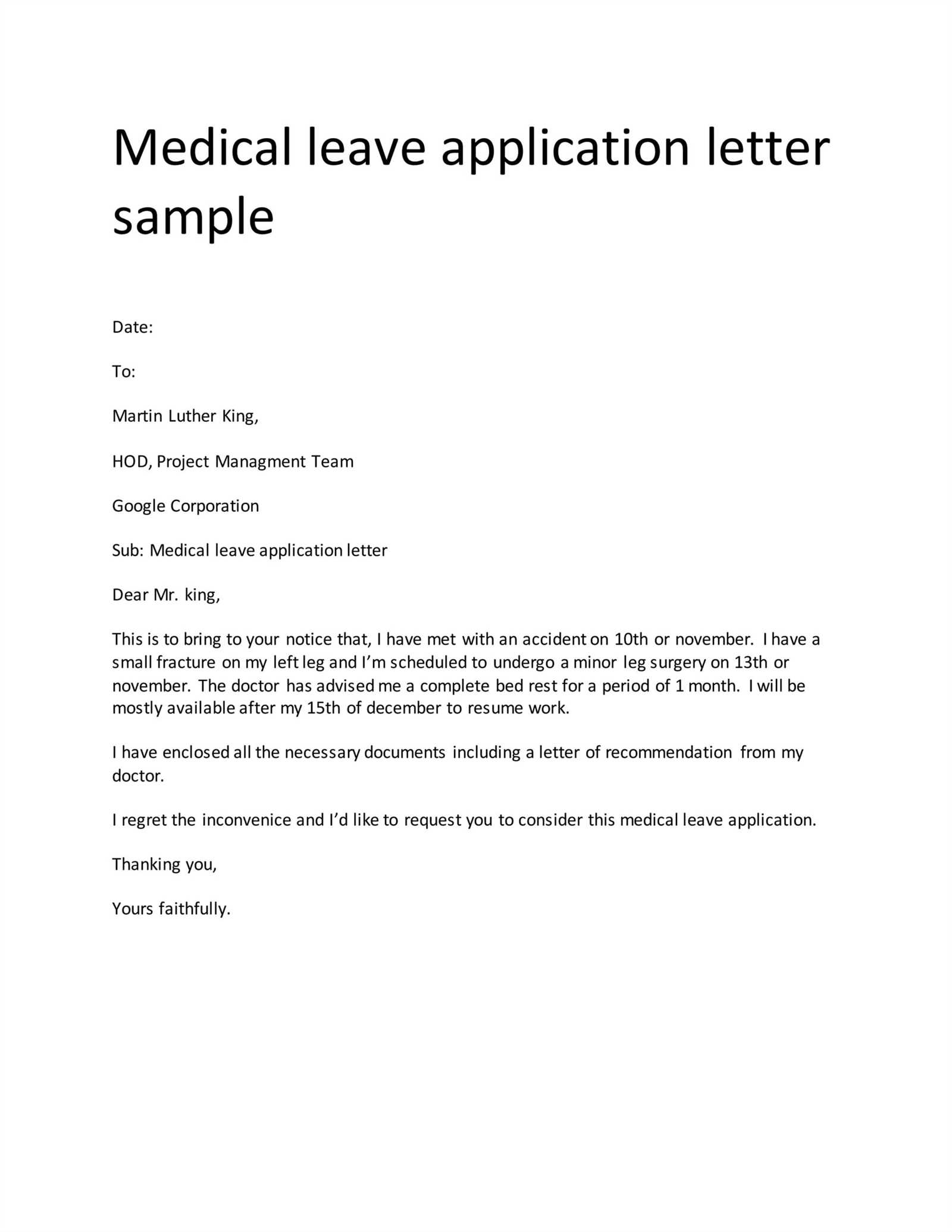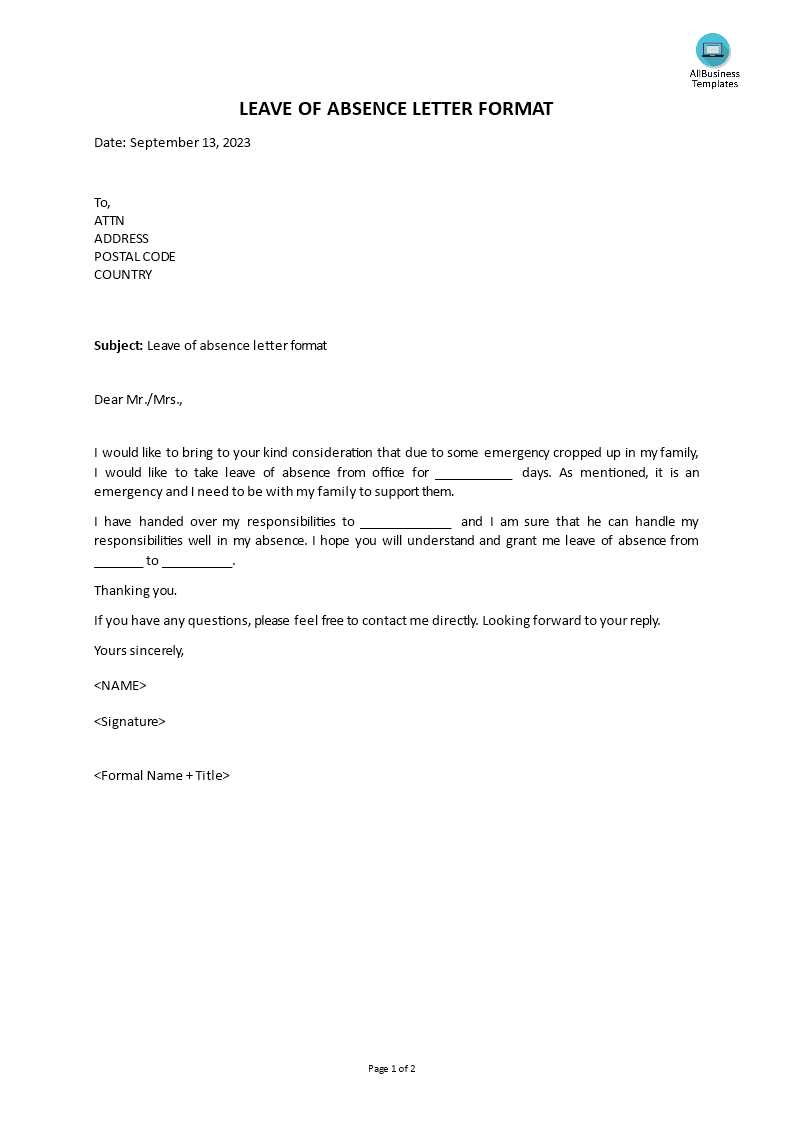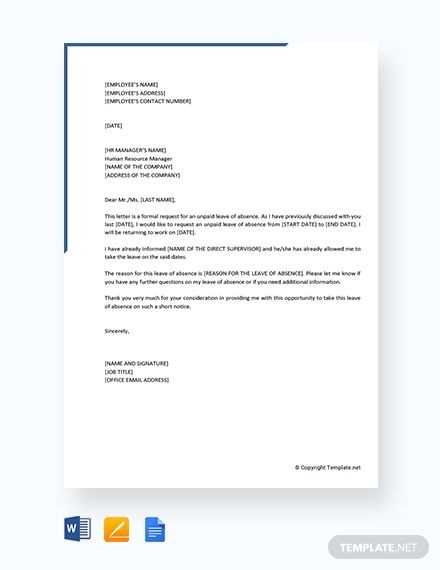Medical Leave of Absence Letter Template for Employees

When health issues arise, it’s important to communicate effectively with your employer regarding the need for time off. A professional request can ensure clarity and maintain a positive working relationship. Crafting a clear message can help outline your situation without revealing unnecessary details, while still providing the necessary information for your employer to approve the time off.
In this guide, we’ll discuss the essential components that should be included in your formal request. Whether you’re dealing with a short-term illness or a longer recovery process, knowing what to include will help ensure your message is both respectful and informative. Having a strong framework for your communication will not only reflect your professionalism but also demonstrate your consideration for company policies and procedures.
Understanding Time Off for Health Reasons
Taking time off due to health conditions is a necessary part of life for many individuals. It’s important for both employees and employers to understand the process of requesting time off when health issues arise. Having clear expectations and guidelines in place ensures that both parties are prepared and informed, which helps prevent misunderstandings and maintains professional relationships.
What is Considered Health-Related Time Off?

Time away from work for recovery, whether due to illness, surgery, or other health-related circumstances, is a standard practice in most workplaces. Employers generally expect employees to provide adequate notice and a valid reason for their request, which could range from a few days to an extended period depending on the severity of the condition. Understanding when and how to formally communicate the need for time off can streamline the approval process and prevent unnecessary delays.
Employer Expectations and Responsibilities
Employers are typically required to support their employees’ health needs by providing reasonable accommodations or time off. However, it’s crucial for both parties to understand their responsibilities. Employers may request documentation to verify the need for time off, and employees should respect any company policies or procedures regarding how to submit requests. Clear communication benefits both the employee’s well-being and the organization’s workflow.
Why You Need a Formal Request
Requesting time off for health reasons requires a clear and professional approach. A written communication ensures that all necessary information is documented, reducing the risk of misunderstandings. Without a formal request, there could be ambiguity regarding your situation, which may lead to delays in approval or even confusion about your intentions. Having a structured approach ensures that both you and your employer are on the same page regarding expectations and procedures.
Clarity and Professionalism
A well-crafted request provides clarity and maintains professionalism. It shows respect for company policies while helping the employer to manage schedules and plan for your absence. It is also a formal way to express the seriousness of your situation, ensuring that your health concerns are taken seriously without the need for excessive explanation.
Legal and Administrative Requirements
In many cases, employers are required to document time off for health reasons for legal and administrative purposes. A formal request helps both parties meet any legal obligations and ensures that the process is handled correctly. This documentation may be required for records or compliance purposes, particularly in larger organizations with specific policies around time off.
| Reason for Request | Importance of Formal Request |
|---|---|
| Health Recovery | Ensures proper documentation and understanding of the situation |
| Company Policy | Helps meet legal and administrative requirements |
| Professionalism | Maintains a respectful tone and demonstrates responsibility |
Key Elements of a Health-Related Time Off Request

When requesting time off for health reasons, it’s crucial to include specific information to ensure your request is clear, respectful, and easily understood by your employer. A well-structured request not only provides essential details but also sets the right tone, showing professionalism and consideration. Certain elements should always be included to avoid any confusion and to make the process smoother for both parties.
Essential Information to Include
Your request should start with the basic details: the date of your intended time off, the expected duration, and a brief explanation of the reason, if appropriate. While it’s not necessary to go into deep personal details, a general statement about your condition can provide clarity. Additionally, be sure to mention any relevant dates or times, such as appointments or expected recovery timelines, to help your employer plan accordingly.
Formal Tone and Structure
Maintaining a professional tone is key in such communications. While your message should be clear and direct, it’s important to show empathy and appreciation for the company’s understanding. Using polite phrasing and expressing gratitude for any support provided during your time away creates a positive impression. A structured format that includes the reason, dates, and a closing statement ensures that your message is comprehensive and easy to read.
How to Write an Effective Request

When making a formal request for time off due to health concerns, clarity and professionalism are key. A well-constructed message will ensure that your employer understands the situation, allowing for a smooth approval process. The structure and tone of your communication play an important role in conveying the seriousness of the matter while maintaining respect for workplace policies.
Steps to Craft a Clear Message
- Start by addressing the appropriate person, typically your direct supervisor or HR representative.
- Clearly state the dates you require time off, including start and end times.
- Provide a brief, non-invasive explanation of why you need time off, if desired.
- Offer to provide any necessary documentation, such as a doctor’s note, if requested by your employer.
- Express your willingness to assist with any transition or pending tasks before your time off.
- Conclude with a polite thank you for their understanding and consideration.
Tips for a Professional Tone
- Be respectful and concise in your writing.
- Avoid unnecessary details or personal information about your health.
- Maintain a positive and cooperative attitude in your message.
- Ensure your language is formal and polite, demonstrating professionalism.
Common Mistakes to Avoid
When submitting a formal request for time off due to health issues, it’s important to approach the task carefully to avoid misunderstandings or delays. Many people make simple mistakes that can affect the clarity of their message and hinder the approval process. Recognizing and avoiding these errors will help ensure a smoother communication process and increase the likelihood of your request being granted without issues.
Unclear or Insufficient Information
One common mistake is failing to provide all the necessary details. Your employer needs clear information about the dates you plan to be away and a brief explanation of the reason. Without these key points, your request may seem incomplete or vague, leading to confusion. Always make sure to specify the start and end dates of your absence and include any other relevant information such as potential return dates or medical appointments.
Over-Explaining or Giving Too Much Detail
While it’s important to provide some context, over-sharing personal health details can make the request uncomfortable or seem unprofessional. Avoid going into excessive detail about your medical condition. Instead, keep your explanation brief and focused on the necessary facts, offering more information only if required. Keep your communication professional and respectful of your privacy and your employer’s time.
Ensuring clarity and brevity in your request is crucial to avoid potential misunderstandings and unnecessary delays.
When to Submit Your Time Off Request
Timing is crucial when requesting time away from work due to health reasons. Submitting your request at the right moment can help ensure smooth approval and allow your employer to plan accordingly. Ideally, giving sufficient notice not only shows consideration but also helps prevent disruptions in workflow. Understanding the right time to submit your request is important for both you and your employer.
If possible, submit your request as early as you can, especially for planned medical procedures or appointments. This allows your employer to adjust schedules or make necessary arrangements in advance. In the case of unexpected health issues, try to inform your employer as soon as you’re able, keeping them updated on your situation. By providing ample time, you help maintain a professional environment while ensuring your needs are met without unnecessary stress.
Handling Responses from Your Employer
Once you’ve submitted a request for time off due to health concerns, it’s important to approach any response from your employer with professionalism and understanding. Employers may have questions or need further clarification, and they might either approve or ask for adjustments to your request. How you handle these responses can affect your relationship and ensure that the process runs smoothly.
Responding to Approval
When your request is approved, be sure to express gratitude and confirm the details. Acknowledging the approval shows appreciation for your employer’s flexibility. If the approved dates differ from your initial request, take a moment to clarify the final arrangements and ensure there are no misunderstandings regarding your time away.
Handling Requests for Modifications
If your employer suggests changes or requires additional information, respond promptly and professionally. Address any concerns they raise and offer solutions, such as adjusting your work schedule before or after your time off, if possible. Maintaining an open and cooperative attitude will help foster positive communication and demonstrate your commitment to your role.